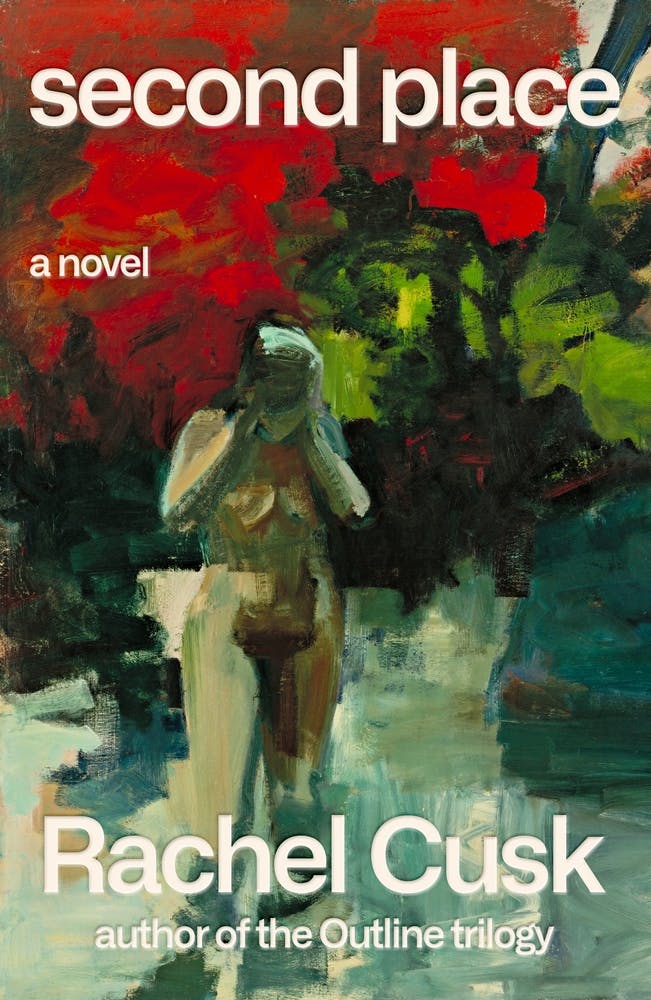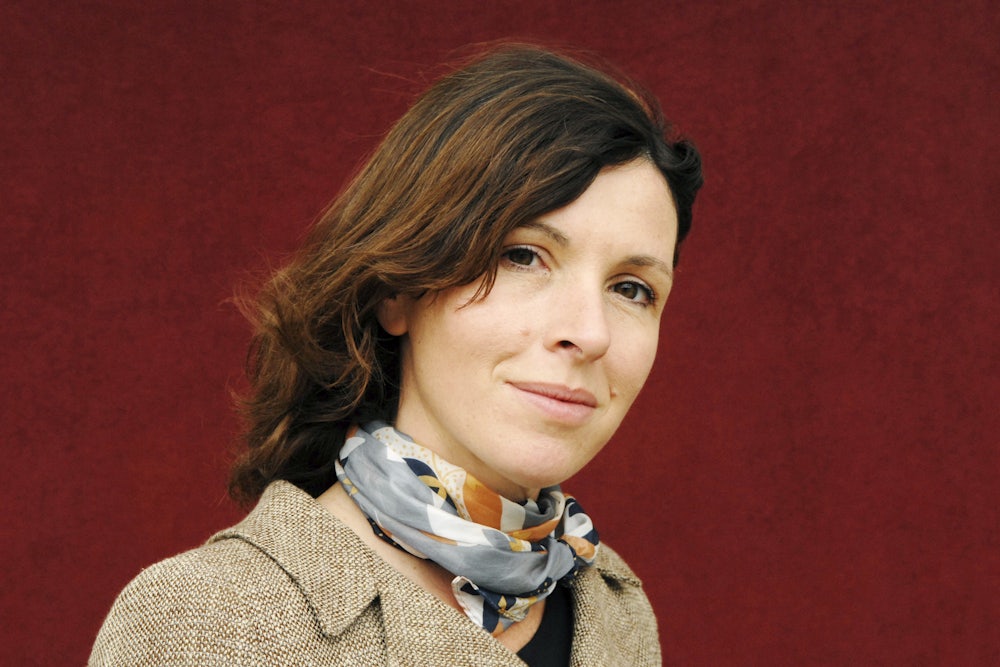Over 15 books, one play, and many shorter published prose pieces, Rachel Cusk has accrued a reputation for regality. Although her subject has frequently been the messier side of living while female, a subject often associated with the messier side of writing, Cusk detractors and superfans alike have been provoked by her aesthetic of rigor and a ruthless commitment to real life. Her new novel, Second Place, is something of a departure from that persona, but one that turns directly to face its chief problems, including but not limited to egotism, gender stereotyping, and the confused ethical relationship between art and real estate.

Using a chipper register swarmed by exclamation marks, in Second Place Cusk establishes a narrator much like herself: a woman author who lives in a corner of England so gorgeous that it moves her to sentimental statements like, “The pattern of change and repetition is so deeply bound to the particular harmony of life, and the exercise of freedom is subject to it, as to a discipline.” Through letters, she tempts an elderly male painter called L into staying in a house on her property called the Second Place, where guests frequently spend time and finish their various creative projects. She assumes an affinity between the landscape and L’s paintings, and hopes that they will have a meeting of minds beyond a mutual source of inspiration.
When L arrives, he seems about David Hockney’s age, and there’s a lissome young girlfriend named Brett in tow. The narrator’s precious marshside kingdom goes topsy-turvy immediately. Threatened by Brett, it shrivels back down into a home—a place where women bristle at each other. “I can colour your hair for you to hide the grey, you know,” Brett says (Farrar, Straus and Giroux’s U.S. edition retains British spellings) to her hostess, running her hand through it. “It’s really quite dry.” Meanwhile, the narrator’s daughter Justine and her shiftless boyfriend have arrived, lending the artistic summit the air of a country house farce where murder is bound to happen.
As if unsure how to control the pitch of all this emotion, Cusk has borrowed the novel’s rough conceit from Mabel Dodge Luhan’s novel about D.H. Lawrence, Lorenzo in Taos, which is addressed to a person named Jeffers. (“Does catastrophe have the power to free us, Jeffers?” asks Cusk’s narrator.) But we learn nothing at all about this second Jeffers, and so the form of address reads like a send-up of the epistolary novel more than an epistolary novel, with the ridiculous name of her confidant evoking a chauffeur or some other aristocrat’s professional acquaintance. The protagonist is a landowner, after all, and her huffs and puffs over everybody’s misbehavior on her turf—her literal turf, when you consider the marsh—show a relationship between her wish to control her daughter and her wish to own the landscape that inspires a great artist when she’s not busy being a great artist.
The subject of real estate is a provocative and generative one in Cusk studies. Her fictional heroines always seem to be traveling, making their homes loom large by their absence, like something repressed. Faye in the Outline trilogy roved from Athens to Germany, her inner monologue as precise and elegant as an obituary: “It may be the case that to find that home is to end one’s quest,” she says in Kudos, “but it is with the feeling of displacement itself that the true intimacy develops and that constitutes, as it were, the story.” The tasteful home is the place where Cusk’s protagonists have the illusion of control; and it’s frequently the place they must leave.
The modernist compound of Second Place hews closely to Cusk’s actual house in Norfolk. The feudal atmosphere of the novel connects back to something she wrote in Aftermath, about divorce being like the Dark Ages, and the rude autonomy of second marriage resembling a civilizational rebuild. She remembers an old teacher who loved medieval history, who taught her, “Civilization, order, meaning, belief: these were not sunlit peaks to be reached by a steady climb. The darkness, the disorganization that succeeded them had their own existence, their own integrity; were betrothed to civilization, as sleep is betrothed to activity.”
The narrator’s gloom over the state of her court offers a sort of satire on the lack of self-awareness Cusk has previously displayed when it comes to her own considerable privilege (though her defenders might construe her attitude more as a conscious disregard for what other people think of her). Instead of turning away from criticism, Cusk leans into the idea of protagonist as a property owner in Second Place, as if Cusk is daring the people who called her “petty and irritable,” as Ian Sansom (an author of poorly selling mystery fiction) did, for writing about being unhappy in her remodeled London house, to hate her now for being unhappy in her coastal compound. This way, the narrator becomes a little cartoonish and self-pitying, and therefore fit for the horrible burlesque that cranks into being when L reveals himself to be a misogynist and overall dreadful houseguest. It’s Brett who eventually explains that L has simply grown indignant over his loss of status, his work’s literal devaluation by the culture:
“If you ask me,” Brett said, “it’s everything else that’s changing, not him. He preferred it like it was before. He’s sulking, that’s all. He wants back all the things he pretended to take for granted.” The art market had completely collapsed, she went on, after years of crazed overvaluing, so there were a lot of people in the same boat as L—and far worse, because they didn’t have his pedigree. But there were others—a small number—whose reputations and fortunes were surviving unharmed.
This is all, of course, implicitly the narrator’s fault, in L’s eyes. The breakdown, when it comes, is glorious: L snaps, leaping up on a tabletop like a cat to cavort “like a blazing-faced devil.” Later, L will paint “a Garden of Eden, Jeffers, except a hellish one!”—all the talk of Adam and Eve forcing a rigid sort of gender typology onto all the characters.
This erring into the freakiness of tradition, into stories about snakes and divine revelations of knowledge, gives Second Place a looser feel than Cusk’s previous works about gender and domesticity. The chaos L’s visit unleashes takes her somewhere more fun, to see how the roles of the woman artist (arbitrarily here the landowner, mother, writer, secret self) and those of the man (the guest, bachelor, painter, public persona) do not split quite down the middle, nor do their roles do anything so simple as reverse. The balance of power is deeply unstable, as the narrator tilts from crowing lord to humiliated crone and back again, while L’s cruelty and uncompromising commitment to himself is undermined by the effect of time on his body.
In memoir, Cusk has gone so far out to the hinterlands of cisgender heterosexual femininity that it has begun to liquidate underfoot; Second Place finds a more mythic setting for Cusk’s signature tensions. The protagonist is not caught in the troubled extremes of marriage; yet still, she feels trapped and humiliated, there is still the problem of being a woman. Just before the real bloodshed begins, she makes an offhand comment that appears to cause L to lose his mind. Having chased him around the grounds, desperate for his approval, she says, “I’ve never had enough fun.… I’ve had other things, but never that. Perhaps it’s as you say, that I force things to happen, and it’s in the nature of fun not to be forced.”
It’s an incredibly depressing thing to say, though true, because it’s the observation of a martyr coveting joys she has declined. And it heightens the religious drama Cusk is playing with, because her use of “force” frames the landowner-narrator as a kind of evil God, moving her guests around on a chessboard at her own sick pleasure. Second Place is a study of tyranny as much as of gender; or, rather, it shows the places where they conveniently back one another up.
Having studied men and women like dangerous animals in her rigorous and ample work to date, from captivity to ferality and back again, in Second Place Cusk lets the male and female artists inside her loose on each other in a sealed compound. There, she finds the limits of detachment, and the possibilities opened up by occasionally allowing oneself to be provoked.








